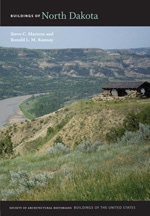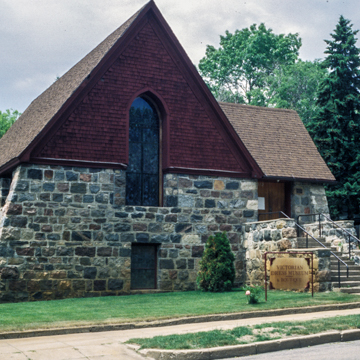You are here
Victorian Dress Museum (St. Paul’s Episcopal Church)
St. Paul’s Episcopal congregation dates from 1891 when the bishop of North Dakota brought his cathedral car to Rugby on a missionary visit. The Gothic Revival church is constructed of roughly dressed local granite fieldstone. The split-faced stones on the primary facades are more rectangular and more closely fitted than the rough-cut, boulder-sized stones at the rear. Raised false mortar joints are used throughout—a technique found on other Episcopal churches in the state. The large front-facing gable of the nave dominates the design. Corners of the building are extended in the manner of buttresses on the facade and side porches. Small rectangular windows are tucked high under the shallow eave extension, and green-stained wood shingles fill in the gable ends. The stained glass windows were relocated here as a gift to this “prairie mission” church from Holy Trinity Episcopal Church in New York City (demolished 1899) by paying the shipping costs of $40. Inside the church, four heavy wood cross trusses enhance the fine wood ceiling and wainscoting. The church closed in 1978 and the building remained vacant until 1991, when it was purchased by a local funeral director for community use. It is currently used as a museum for displaying a collection of reproduction Victorian dresses and accessories.
Writing Credits
If SAH Archipedia has been useful to you, please consider supporting it.
SAH Archipedia tells the story of the United States through its buildings, landscapes, and cities. This freely available resource empowers the public with authoritative knowledge that deepens their understanding and appreciation of the built environment. But the Society of Architectural Historians, which created SAH Archipedia with University of Virginia Press, needs your support to maintain the high-caliber research, writing, photography, cartography, editing, design, and programming that make SAH Archipedia a trusted online resource available to all who value the history of place, heritage tourism, and learning.











